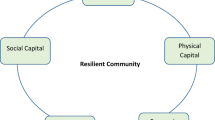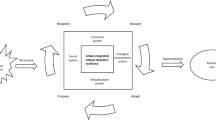Abstract
Cities in Indonesia have continued to develop into centers of activity and their position in disaster-prone areas such as fault zones and coastlines leads to higher risks to various threats of natural and social disasters that can disrupt the balance of city performance. A framework of urban disaster resilience indicators is needed as an instrument to measure the performance of cities in Indonesia in overcoming and adapting to disaster events that can occur anytime and anywhere. From the results of the analysis based on a review of the literature theory and concept of disaster resilience, Regional Capacity Index as an indicator framework is still less able to describe the actual performance conditions of the urban disaster resilience according to the facts of the field. There are physical and social characteristics of the region as attributes of vulnerability to be factors that should also be considered as an indicator of the urban’s resilient performance against the threat of disaster. The formulation of indicator frameworks is proposed which is divided into three main dimensions: the physical-ecological dimension of the region, the socio-economic dimension of the community, and the administrative dimension. The recommendations are expected to be an input for the government and especially to Badan Nasional Penanggulangan Bencana (BNPB) or the National Disaster Management Agency (NDMA) in developing a framework of disaster resilience city performance indicators in Indonesia.
Access this chapter
Tax calculation will be finalised at checkout
Purchases are for personal use only
Similar content being viewed by others
References
Davis I (2014) Disaster risk management in Asia and the Pacific. In: Disaster risk management in Asia and the Pacific. https://doi.org/10.4324/9781315761336
Gunawan I, Sagala S, Amin S, Zawani H, Mangunsong R (2015) City risk diagnostic for urban resilience in Indonesia. World Bank, Jakarta
Komendantova N, Scolobig A, Garcia-Aristizabal A, Monfort D, Fleming K (2016) Multi-risk approach and urban resilience. Int J Disaster Resilience Built Environ. https://doi.org/10.1108/IJDRBE-03-2015-0013
Shaw R, Takeuchi Y, Joerin J, Fernandez G, Tjandradewi B, Irawati C, Matsuoka Y (2010) Climate and disaster resilience initiative capacity-building program—UNISDR. Kyoto University, Kyoto
Saleh TR, Setiadi H (2020) Resilience of flood disasters in the Wanggu Watershed, Kendari City. IOP conference series: earth and environmental science. https://doi.org/10.1088/1755-1315/436/1/012016
Manyena B, Machingura F, O’Keefe P (2019) Disaster resilience integrated framework for transformation (DRIFT): a new approach to theorising and operationalising resilience. World Dev. https://doi.org/10.1016/j.worlddev.2019.06.011
Cutter SL, Burton CG, Emrich CT (2010) Disaster resilience indicators for benchmarking baseline conditions. J Homel Secur Emerg Manage. https://doi.org/10.2202/1547-7355.1732
Norris FH, Stevens SP, Pfefferbaum B, Wyche KF, Pfefferbaum RL (2008) Community resilience as a metaphor, theory, set of capacities, and strategy for disaster readiness. Am J Community Psychol. https://doi.org/10.1007/s10464-007-9156-6
Cutter SL, Barnes L, Berry M, Burton C, Evans E, Tate E, Webb J (2008) A place-based model for understanding community resilience to natural disasters. Glob Environ Change. https://doi.org/10.1016/j.gloenvcha.2008.07.013
Moghadas M, Asadzadeh A, Vafeidis A, Fekete A, Kötter T (2019) A multi-criteria approach for assessing urban flood resilience in Tehran, Iran. Int J Disaster Risk Reduction. https://doi.org/10.1016/j.ijdrr.2019.101069
Baba K, Nagata Y, Kawakubo S, Tanaka M (2020) A framework and indicators of resilience. Resilient Policies Asian Cities. https://doi.org/10.1007/978-981-13-8600-8_1
Oktari RS, Comfort LK, Dwitama P (2020) Measuring coastal cities’ resilience toward coastal hazards: instrument development and validation. Prog Disaster Sci. https://doi.org/10.1016/j.pdisas.2019.100057
Parsons M, Glavac S, Hastings P, Marshall G, McGregor J, McNeill J, Morley P, Reeve I, Stayner R (2016) Top-down assessment of disaster resilience: a conceptual framework using coping and adaptive capacities. Int J Disaster Risk Reduction. https://doi.org/10.1016/j.ijdrr.2016.07.005
Acknowledgements
The preparation of this research certainly cannot be completed properly without the support and constructive input from people around. I thank to Dr. Triarko Nurlambang, M.A. and Dr. Lin Yola, M.Sc. as the supervisor who has provided a lot of guidance and direction in compiling this research. Hopefully this research can be useful for the development of urban management in Indonesia.
Author information
Authors and Affiliations
Corresponding author
Editor information
Editors and Affiliations
Rights and permissions
Copyright information
© 2022 The Author(s), under exclusive license to Springer Nature Singapore Pte Ltd.
About this paper
Cite this paper
Pranadi, R., Nurlambang, T., Yola, L. (2022). Evaluation of Urban Resilience Performance Indicator Frameworks in Indonesia. In: Yola, L., Nangkula, U., Ayegbusi, O.G., Awang, M. (eds) Sustainable Architecture and Building Environment . Lecture Notes in Civil Engineering, vol 161. Springer, Singapore. https://doi.org/10.1007/978-981-16-2329-5_8
Download citation
DOI: https://doi.org/10.1007/978-981-16-2329-5_8
Published:
Publisher Name: Springer, Singapore
Print ISBN: 978-981-16-2328-8
Online ISBN: 978-981-16-2329-5
eBook Packages: EngineeringEngineering (R0)




